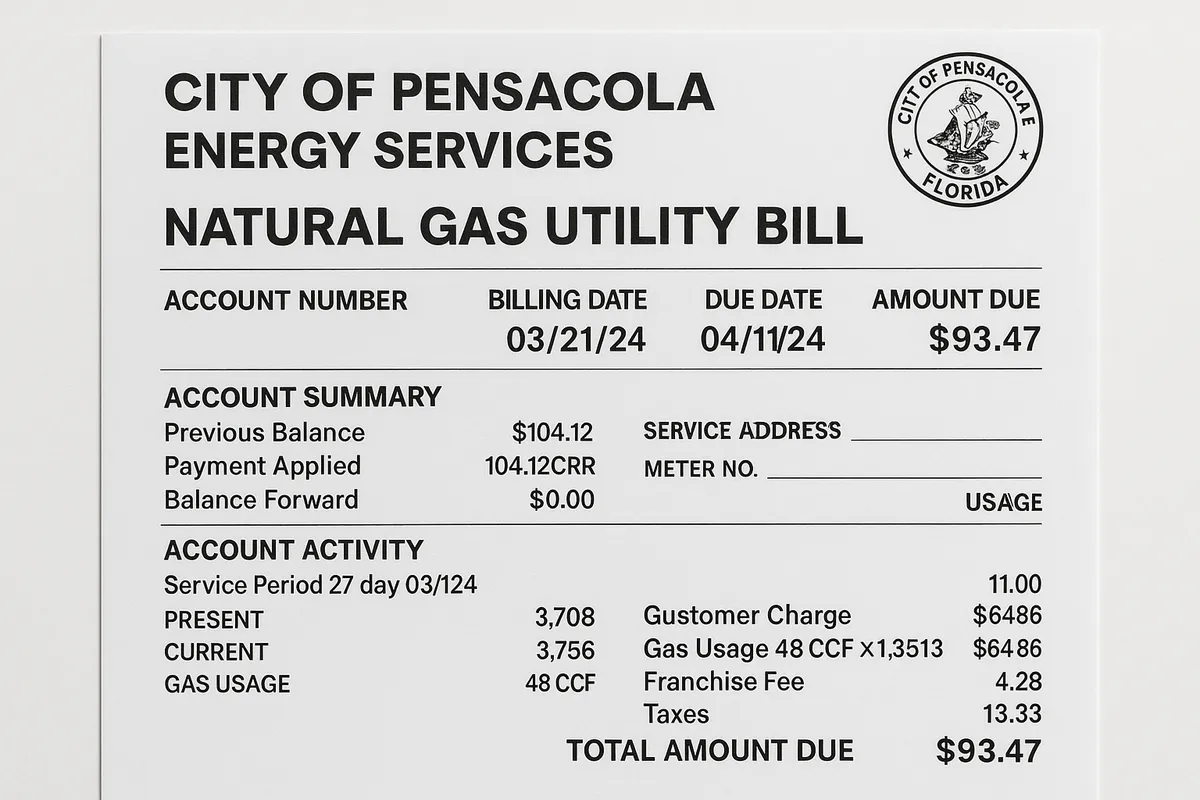
Natural gas customers of the City of Pensacola (also known as Pensacola Energy or Energy Services of Pensacola) at any time since Aug. 6, 2011, whose service address was inside the Pensacola city limits may be eligible to claim a cash award from a class action settlement.
The City of Pensacola agreed to pay $12,600,000 to settle a class action lawsuit alleging the city improperly charged franchise fees and related utility service taxes to natural gas customers within city limits.
Who can file a City of Pensacola claim?
Class members include both residential and business customers who meet the following criteria:
- They were a natural gas customer of the City of Pensacola (including Pensacola Energy or Energy Services of Pensacola) at any time from Aug. 6, 2011, to the present.
- The service address for the natural gas account was located inside the Pensacola city limits.
The class is divided into two main groups:
- Current customers: Anyone who currently has a natural gas account with the City of Pensacola. These class members do not need to file a claim.
- Former customers: Anyone who previously had a natural gas account with the City of Pensacola and does not currently have service. These class members must submit a claim form to receive compensation.
How much can class members get?
Pro rata payment: The total settlement fund is $12,600,000. The amount each person or business can receive is based on the total franchise fees the City of Pensacola billed them since Aug. 6, 2011.
Each class member’s share is calculated using the following formula:
- Individual award = Net settlement amount × (class member's franchise fees billed ÷ total franchise fees billed to all class members)
How to claim a class action rebate
- Current customers: No action is required. The settlement administrator will mail checks automatically to the address on file. If a current customer’s address has changed, they should update their information with the settlement administrator.
- Former customers: These class members must file a claim online or download, print, complete and mail a PDF claim form to the settlement administrator.
Settlement administrator's mailing address: Frank v. City of Pensacola c/o Kroll Settlement Administration LLC, P.O. Box 225391, New York, NY 10150-5391
What information is required to submit a claim?
- All class members must provide the class member ID located on their settlement notice. Those who do not have a class member ID can request one by filling out the contact form or calling 833-890-3973.
- Individuals must provide one of the following: driver’s license number, last four digits of Social Security number, date of birth or customer number.
- Business organizations registered with the Florida secretary of state must provide one of the following: federal employer identification number, Florida Department of Revenue consumer certificate of exemption number (Form DR-14) or customer number.
Payout options
- Current customers will receive their payment by check mailed to the address on file.
- Former customers can choose to receive payment by check or, if they file online, by electronic payment.
Important dates
- Deadline to file a claim: One year from the administrator’s completion of the initial notification process. The exact date will be provided by the settlement administrator.
When is the Frank v. City of Pensacola payout date?
The settlement administrator will mail payments approximately 15 days after the settlement is finalized.
Why did this class action settlement happen?
The class action lawsuit alleged the City of Pensacola improperly charged franchise fees and related utility service taxes to natural gas customers within city limits. The plaintiffs claimed the city was not authorized to pass these fees on to customers and that the fees constituted impermissible taxes under the Florida constitution.
The court entered a final judgment enjoining the city from continuing to charge these fees and approved the settlement to return the improperly collected amounts to customers. Both sides agreed to settle to avoid the cost and risk of further litigation and appeals.
.png)







.webp)
.webp)
.webp)

.webp)
.webp)
.webp)
.webp)







.svg)
Comments